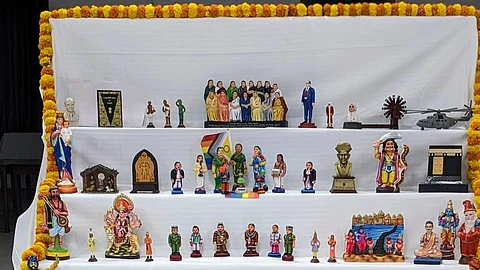

In a world divided by differences, there are moments when traditions transcend their origins and become beacons of unity. This year’s Gombe Habba (a traditional doll display that is part of Navaratri celebrations) in Bengaluru by Reclaim Constitution is one such moment. Reclaim Constitution, started by Bengaluru-based aerospace engineer Vinay Kumar, is an initiative that seeks to promote constitutional values. The infusion of constitutional values into this age-old festival aims to bridge gaps in people’s grasp of constitutional values as well as foster a sense of collective purpose.
In the community doll display organised by Reclaim Constitution, individuals of all faiths and religions were invited to contribute dolls reflecting the values enshrined in the Preamble to the Indian Constitution. At the heart of the display are miniature representations of 15 women members of the Constituent Assembly — Ammu Swaminathan, Dakshayani Velayudhan, Begum Aizaz Rasul, Durgabai Deshmukh, Hansa Mehta, Kamla Chaudhary, Leela Roy, Malati Choudhury, Purnima Banerjee, Rajkumari Amrit Kaur, Renuka Ray, Sarojini Naidu, Sucheta Kriplani, Vijaya Lakshmi Pandit, and Annie Mascarene, collectively known a the Founding Mothers of India. Besides this, the display also includes the Nativity scene from the Bible, the Muslim worship place Kaaba, Gommateshwara, Buddha, and LGBTQIA+ pride march.
The display, open on October 21 and 22 free of charge to all, provides a unique opportunity for people to engage with these symbolic representations.
The panel discussions held as part of the event on October 21 delved into the foundational values on which the Indian Constitution has been framed. They explored the current state of syncretic traditions in India and emphasised the need to preserve them for future generations.
Speaking on the syncretic traditions of India, author and India chair of Amnesty International Aakar Patel said, “Syncretism is inseparable, like khichdi (rice and lentil porridge), you can’t separate it logically.” He added, “If an outsider was to visit India, it would be difficult for that individual to differentiate between a Hindu, a Muslim, a south or a north Indian. This is what Freud called narcissism of small differences.” He asserted that external differences were, more often than not, imposed in the modern era.
Lawyer Arvind Narrain shed light on how the Constitution protects syncretism. Drawing attention to an observation made by Jawaharlal Nehru while debating the first amendment, he said, “Nehru’s speech during the First Amendment says, ‘We have found that this magnificent Constitution that we had framed was later kidnapped and purloined by lawyers.’ I think the point really is how the artist takes ownership of the Constitution.” Arvind emphasised the critical role artists play in taking ownership of the Constitution and restoring it to the people, thus allowing its values to resonate on a personal level.
Arvind further delved into the language of the Constitution, often perceived as complex and distant. Highlighting the need to make constitutional values widely accessible, he noted that stories, particularly those that underlie the making of the Constitution, offer a powerful means to communicate its essence. “Through the recovery of these narratives, the Constitution becomes not just a legal text, but a living, relatable entity,” he said.
Another highlight of the event was a rivayat, commonly performed by Hindus during the Muslim festival of Muharram. The rivayat, a ballad recounting the Battle of Karbala, was led by Raghava Reddy, Dose Eranna, and Usman Ali from Bellary’s Agasanur village. The Battle of Karbala, which took place on the 10th day of Muharram in 680 CE, has immense significance for Shia Muslims. The evocative renditions in Kannada paid tribute to the martyrdom of Prophet Muhammad’s grandsons Hussain and Hasan in the battle. These songs are traditionally sung on the tenth day of Muharram in the village.